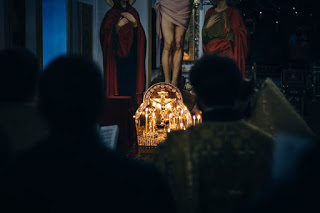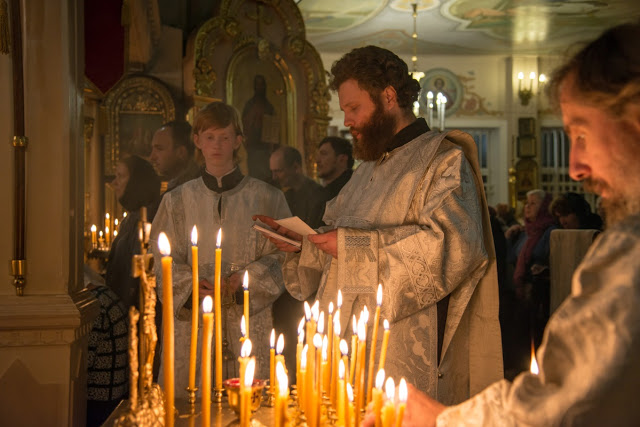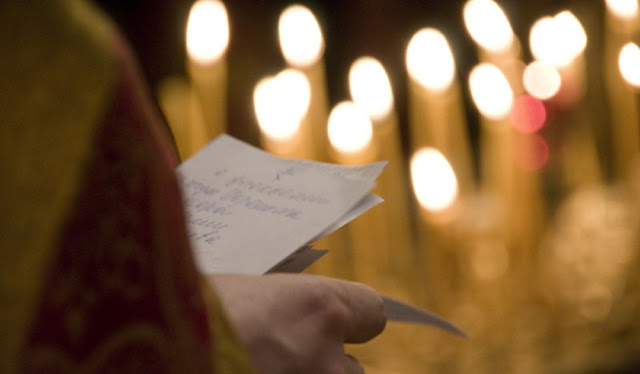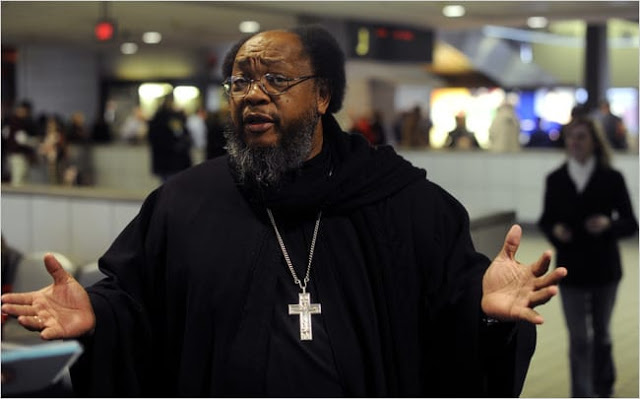
 What follows is directions on how to set up a private commemoration book for use in one’s private prayers (for commemorations at the liturgy, one should either use the slips provided at the candle counter in their parish, or use a book designed for that purpose). I make no claims to this being the way to organize private commemorations, but it is the way I was shown when still a relatively new convert, and it may be of help to others.
What follows is directions on how to set up a private commemoration book for use in one’s private prayers (for commemorations at the liturgy, one should either use the slips provided at the candle counter in their parish, or use a book designed for that purpose). I make no claims to this being the way to organize private commemorations, but it is the way I was shown when still a relatively new convert, and it may be of help to others.First off, one should either use spiral notebook (probably best to use a smaller size than 8 1/2 by 11) or one of those blank books that usually can be found in most bookstores.
At the top of each section, put:

Below the cross, each section begins with a prayer, and then you list those in that category that you wish to pray for. Leave a healthy amount of blank pages between each section for additions.
1) For the Orthodox living:
For the first section, on the first line beneath the Cross, write the prayer: “Grant, O Lord, health and salvation to Thy servants…” And then list your family members, your Heirarchs, those in your parish, your God-children (if you have any), people who have requested prayers, and then any other Orthodox people you wish to pray for.
2) For the Orthodox Reposed:
Begin with the prayer, “Grant, O Lord, repose with the Saints to Thy servants…”
3) For the Catechumens:
Begin with the prayer, “Grant, O Lord, that Thy holy will be done with thy servants…”
 4) For the Non-Orthodox living:
4) For the Non-Orthodox living:Begin with the prayer, “Grant, O Lord, that thy servants will be illumined with the light of the Orthodox Faith, and numbered with Thy one, Holy, Catholic, and Apostolic Church…”
5) For the Non-Orthodox reposed:
Begin with the prayer, “Have mercy, O Lord, if it be possible on the souls of Thy departed servants (names), who have departed into eternal life in separation from Thy Holy Orthodox Church: unsearchable are Thy decrees. Do not account this, my prayer as a sin, but may Thy holy will be done.”
For awhile I wondered what the origin of this prayer was, but found out when I read The Soul After Death by Father Seraphim Rose. It was the response of a Russian Saint (if I recall correctly it was either the New Martyr Metropolitan Joseph or the New Martyr Metropolitan Benjamin) to the question of how one should pray for a non-Orthodox loved one who has reposed.
This prayer is from St. Lev (Leo) of Optina (1768-1841), who is perhaps more commonly known as Elder Leonid of Optina. He was baptized Lev, became Leonid as a monk, and became Lev again as a schemamonk. He is commemorated on Oct. 11/24, the anniversary of his repose and the day after the commemoration of the Elders of Optina (Oct. 10/23).
The English-speaking world knows him best from the biography by Fr. Clement Sederholm translated into English and published by the St. Herman of Alaska Brotherhood (1990), Elder Leonid of Optina.
The publishing house of the Optina Monastery published in 1994 in Russian Life of the Optina Elder Hieromonk Leonid (in schema Lev), a reprint of a 1917 edition, also from Optina. I got my copy of this by mail from Jordanville.
The prayer is from St. Leo’s consolation of his young disciple Pavel Petrovich Tambovtsev, who was in despair over the suicide of his father and seems to have died from the effects of this depression soon after, at age twenty-six. He had seen this suffering-to-come in a dream of his own crucifixion.
The prayer is given in the Platina edition on p. 196: “Seek out, O Lord, the lost soul of my father, if possible, have mercy! Thy judgements are unfathomable. Do not account this prayer of mine as a sin. May Thy holy will be done.”

That first sentence is an example of the importance of proper punctuation, as the Russian original shows that it needs a semi-colon after “possible” for the importantly correct meaning. So it should be:
“Seek out, O Lord, the lost soul of my father; if possible, have mercy! Thy judgements are unfathomable. Do not account this prayer of mine as a sin. May Thy holy will be done.”
In the 1994 Russian reprint of the Life from Optina, there is a footnote that Hieroschemamonk Amvrosy in his time suggested this prayer to those Orthodox who asked him whether and how it was possible to pray for reposed Catholics and Protestants who had been close to them.
And of course the version you have reprinted is an appropriate adaptation.
That concludes the format I was taught, but I have added two things to the back of my commemoration book:
1) From the Old Rite Prayer Book under the heading, “To pray for someone more diligently”:
“Save, O Lord, and have mercy on Thy servant(s)________ [bow], Deliver him (her, them) from every tribulation, wrath and need [bow], From every sickness of soul and body [bow], Forgive him (her, them) every transgression, voluntary and involuntary [bow], And do whatever is profitable for our souls [bow].”
If you wish to pray more diligently for someone who is departed, say this Troparion:
“Grant rest, O Lord, to the soul(s) of Thy departed servant(s) (name(s)). [bow] Forgive and have mercy on him (her, them), for whatever sins he (she) hath (or: they have) humanly committed, as Thou art a God who loveth mankind. [bow] And deliver him (her, them) from eternal torment. [bow] Make him (her, them) a sharer(s) of the Kingdom of heaven. [bow] And do whatever is profitable for our souls. [bow]”

2) From Fr. Anthony Nelson’s Moleben for the victims of abortion. It is adapted for private prayers from the additions to the Great Ektenia:
“Grant, O Lord, mercy, life, peace, health, salvation, and visitation for those who strive against the evil of abortion and pardon and remission of their sins. [bow] Have mercy on Thy servants who strive to save the lives of thine innocent children. Fulfill their saving petitions and forgive all their transgressions, whether voluntary or involuntary. Protect them from every visible and invisible enemy; deliver them from all misery, sickness, and affliction; and grant them health and length of days. [bow]
“Have mercy on all those who have fallen into the hands of the Godless civil authority for the sake of Thy Children, and who languish in courts and prisons; look upon them with compassion; comfort, strengthen, and preserve them, deliver them speedily from bondage and oppression. [bow]
“By thine infinite power, O Lord, move to compassion and mercy the hearts of those who hold Thy servants in cruel captivity; restrain them from doing harm or permitting evil to befall Thy servants but rather cause them to relent and to release them; free the captives whole and unharmed, O Lord, and bestow Thy mercy upon them.
“By thy great mercy, O Lord our God, bring to repentance those who contemplate killing their children and those who would aid them in doing so; revive the natural feelings of these mothers and fathers for their children; and prevent them committing this great sin against innocent blood. Render not unto them according to their deeds, but by Thy great mercy convert them, and unite them to Thy Church. [bow]
“Have mercy, O God, on Thy children condemned to death by the unjust judgement of men. Soften the hearts of those that seek their violent destruction and rescue them that are being led forth to the slaughter. [bow]
“Thy vile enemies, O Lord, have annihilated Thy children and persecuted those that would speak out against their murderous deeds. Look down from heaven, therefore, and behold, and forsake us not up utterly, but quickly cleanse this land and the whole world of the wickedness of those that oppose thee, O God, who art mighty in strength and wondrous in wisdom.” [bow]




